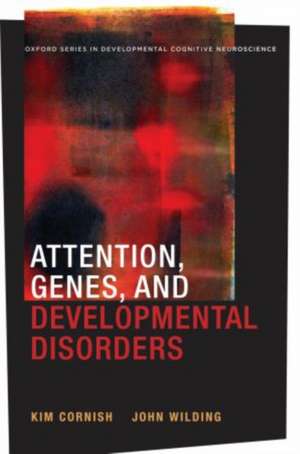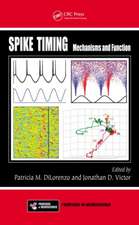Attention, Genes, and Developmental Disorders: Developmental Cognitive Neuroscience
Autor Kim Cornish, John Wildingen Limba Engleză Hardback – 2 dec 2010
Preț: 337.23 lei
Preț vechi: 632.96 lei
-47% Nou
Puncte Express: 506
Preț estimativ în valută:
64.53€ • 69.00$ • 53.80£
64.53€ • 69.00$ • 53.80£
Carte tipărită la comandă
Livrare economică 07-12 aprilie
Preluare comenzi: 021 569.72.76
Specificații
ISBN-13: 9780195179941
ISBN-10: 0195179943
Pagini: 592
Ilustrații: 3 color halftones, 2 B&W Halftones, 33 B&W linearts, 7 combo illustrations
Dimensiuni: 241 x 163 x 38 mm
Greutate: 0.97 kg
Editura: Oxford University Press
Colecția OUP USA
Seria Developmental Cognitive Neuroscience
Locul publicării:New York, United States
ISBN-10: 0195179943
Pagini: 592
Ilustrații: 3 color halftones, 2 B&W Halftones, 33 B&W linearts, 7 combo illustrations
Dimensiuni: 241 x 163 x 38 mm
Greutate: 0.97 kg
Editura: Oxford University Press
Colecția OUP USA
Seria Developmental Cognitive Neuroscience
Locul publicării:New York, United States
Notă biografică
Kim Cornish holds professorships at McGill University, Montreal, Canada, and Monash University, Melbourne, Australia. Professsor Cornish received her Ph.D. in Neuropsychology from the University of London in 1991 and currently directs the Monash Developmental Neuroscience and Genetic Disorders Laboratory. From 2001-2009 she held the Canada Research Chair in Developmental Neuroscience and Education at McGill University. John Wilding is Emeritus Reader in Psychology at Royal Holloway, University of London. He received his Ph.D in Psychology from the University of London in 1970 and has written books on perception and (with Elizabeth Valentine) on superior memory ability. Together, their collaborative work has resulted in numerous scientific publications that have gradually revealed the complexities of gene-environment interactions and the need for subtle hypothesis-driven paradigms that can tap attention pathways in typical and atypical populations. These findings demonstrate theneed to analyze more precisely the notion of "impaired attention" that has become the focus of popular concern, in order to understand and remedy the problems that challenge many children throughout the course of their development.






















